专题10 一般现在时(课件)-2024年小升初英语复习讲练测(全国通用版)(共18张PPT)
文档属性
| 名称 | 专题10 一般现在时(课件)-2024年小升初英语复习讲练测(全国通用版)(共18张PPT) |

|
|
| 格式 | pptx | ||
| 文件大小 | 33.2MB | ||
| 资源类型 | 试卷 | ||
| 版本资源 | 通用版 | ||
| 科目 | 英语 | ||
| 更新时间 | 2024-06-17 00:00:00 | ||
图片预览

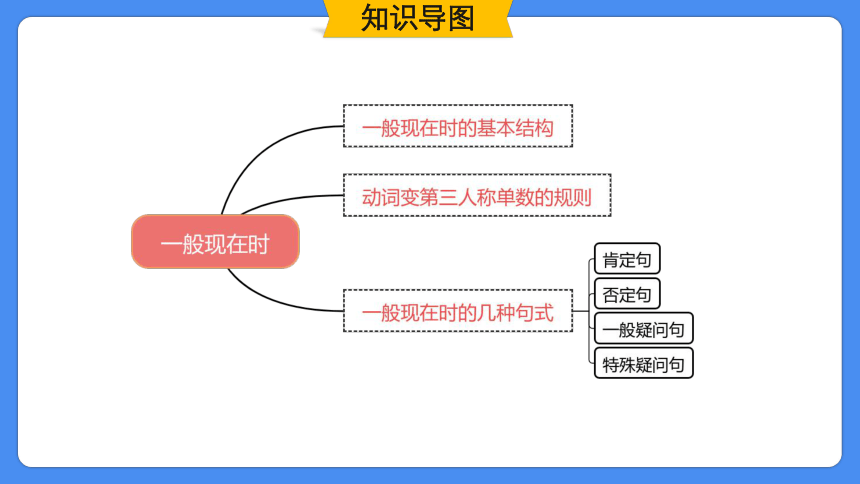
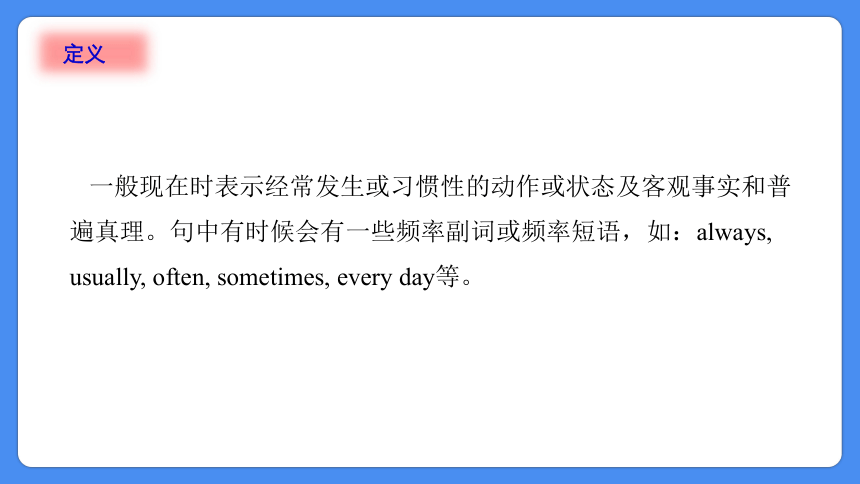
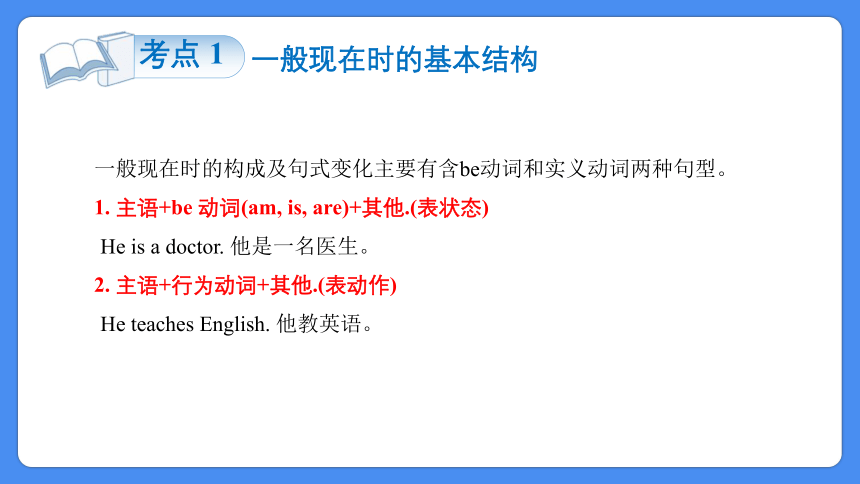
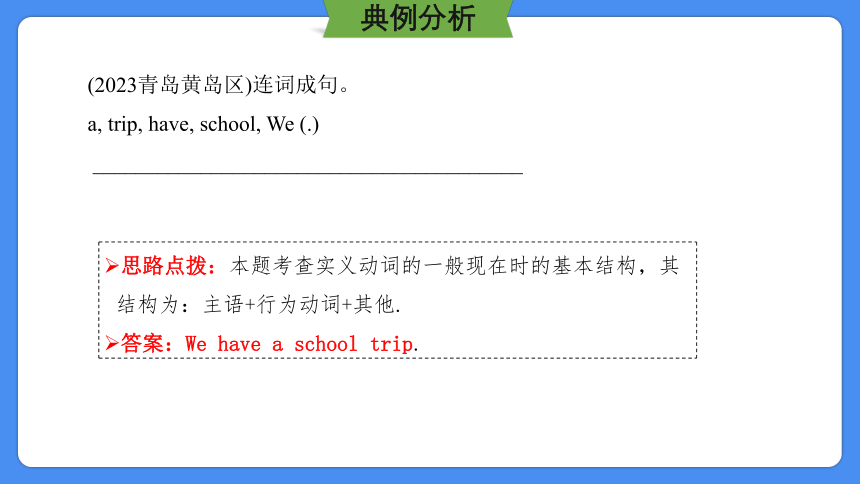

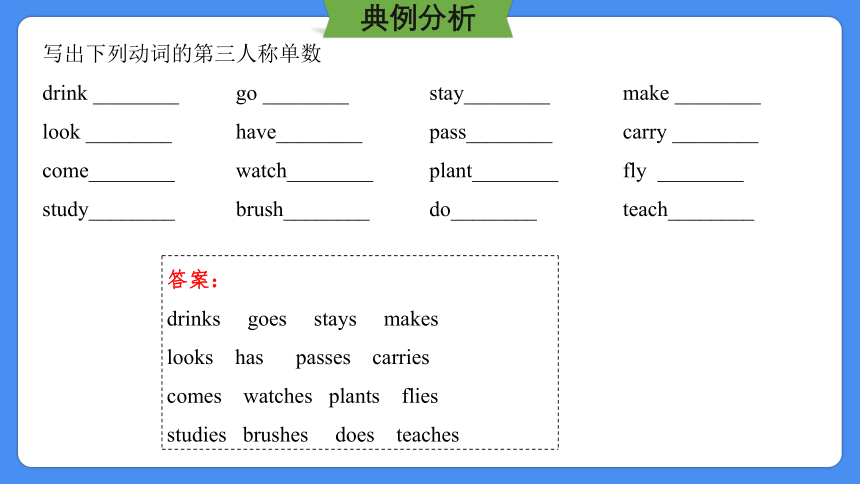
文档简介
(共18张PPT)
第十讲 一般现在时授课人:小升初英语专题复习知识导图
一般现在时表示经常发生或习惯性的动作或状态及客观事实和普遍真理。句中有时候会有一些频率副词或频率短语,如:always, usually, often, sometimes, every day等。
定义
一般现在时的基本结构
考点 1
一般现在时的构成及句式变化主要有含be动词和实义动词两种句型。
1. 主语+be 动词(am, is, are)+其他.(表状态)
He is a doctor. 他是一名医生。
2. 主语+行为动词+其他.(表动作)
He teaches English. 他教英语。
典例分析
(2023青岛黄岛区)连词成句。
a, trip, have, school, We (.)
________________________________________
思路点拨:本题考查实义动词的一般现在时的基本结构,其结构为:主语+行为动词+其他.
答案:We have a school trip.
动词变为第三人称单数形式的规则
考点 2
当主语是第三人称单数时,谓语动词要用动词的第三人称单数形式。其变化如下:
规则 发音 举例
一般情况下,直接加s 清辅音后发/s/ skate—skates;speak—speaks
浊辅音或元音后发/z/ clean—cleans;play—plays
以o,s,x,sh,ch结尾,加es 发/ z/ wash—washes;pass—passes;fix—fixes; watch—watches;finish—finishes;
brush—brushes;catch—catches
以“辅音字母+y”结尾,变y为i,再加es 发/ z/ study—studies;carry—carries;
cry—cries; fly—flies
以“元音字母(a, e,i,o,u)+y”结尾,直接在后面加s 发/z/ stay—stays;play—plays
典例分析
写出下列动词的第三人称单数
drink ________ go ________ stay________ make ________
look ________ have________ pass________ carry ________
come________ watch________ plant________ fly ________
study________ brush________ do________ teach________
答案:
drinks goes stays makes
looks has passes carries
comes watches plants flies
studies brushes does teaches
一般现在时的几种句式
考点 3
1. 含有be动词的一般现在时句型
(1) 肯定句:主语+be(am/is/are) +其他,如:
I am (be) a driver. 我是一名驾驶员。
He is (be) a good boy. 他是一个好孩子。
(2) 否定句:主语+be not+其他,如:
They are not (be not) farmers. They are (be) workers.
他们不是农民,他们是工人。
(3) 一般疑问句:Be+主语+其他
肯定回答:Yes,主语+be
否定回答:No,主语+be+not
例: I am from China.我来自中国。(改为一般疑问句并作回答)
—Are you from China 你是来自中国的吗?
—Yes, I am. 是的,我是来自中国。/
—No, I am not.不是,我不是来自中国。
2. 含有实义动词的一般现在时句型。
(1) 肯定句: 主语+动词原形+其他。(主语为非第三人称单数时用)
主语+动词三单+其他。(主语为第三人称单数时用)
注:非第三人称单数为复数,I 和you;第三人称单数为除了I 和you 的所有单数。如:
I go (go) to the library every week. 我每周都去图书馆。
Lingling goes (be) to the bookshop every week. 玲玲每周都去书店。
(2) 否定句:主语+don’t/doesn’t+动词原形+其他。 如:
I don’t like (not like) swimming. 我不喜欢游泳。
She doesn’t like (not like) swimming. 她不喜欢游泳。
(3) 一般疑问句:Do/Does+主语+动词原形+其他
肯定回答:Yes,主语+do/does.
否定回答:No,主语+don’t/doesn’t.
例:I live in Beijing. 我住在北京。(改为一般疑问句并作回答)
—Do you live in Beijing 你住在北京吗?
— Yes, I do. 是的,我住在北京。/— No, I don’t. 不是,我不住在北京。
例:My father lives in Beijing. 我的爸爸住在北京。(改为一般疑问句并作回答)
—Does your father live in Beijing 你爸爸住在北京吗?
— Yes, he does. 是的,他住在北京。/— No, he doesn’t. 不是,他不住在北京。
(4) 特殊疑问句: 特殊疑问词+do+主语(非第三人称单数) +动词原形+其他
特殊疑问词+does+主语(第三人称单数) +动词原形+其他
What do you usually do after school 放学之后你通常做什么?
此类句子在练习中经常以就划线部分进行提问的形式进行考查(疑问代词的选择参考代词部分),如:
①I usually play basketball after school. (对划线部分进行提问)
When do you usually play basketball
②The woman works in a bookshop in Beijing. (对划线部分进行提问)
Where does the woman work in Beijing
典例分析
单项选择。
( ) 1. Miss Li ________a bag. I ________a book.
A. have;has B. has;have C. is;have
( ) 2. Jim ________ basketball every day.
A. play B. plays C. playing
( ) 3. ________ you r brother usually ride a bike to school
A. Does B. Do C. Is
思路点拨:
1.本题考查一般现在时。Miss Li是第三人称单数,应用has。I是第一人称,应用have。
2.由every day可知此处表示经常性或习惯性的动作,时态是一般现在时。又因Jim是第三人称单数,所以动词用第三人称单数形式plays。
3.由usually可知本题考查一般现在时疑问句的助动词。句中有实义动词ride,your brother是第三人称单数,因此要借助助动词does构成一般疑问句。
答案1.B2.B3.A
一、用所给单词的适当形式填空。
1. My father has a lot of books. He ________(like) reading.
2. —What does Bob do on Sundays
—He often ______________(watch) cartoons.
3. She ________(read) English every morning.
4. What time ________ his mother ________(do) the housework
典例分析
likes
watches
reads
does
do
二、单项选择。
( ) 1. My sister ________ a nurse. She ________ swimming.
A. is;like B. is;likes C. are;like D. are;likes
( ) 2.—________ they often ________ these old men
—Yes, they ________.
A. Do;help;are B. Are;helping;are C. Do;help;do D. Are;helped;do
典例分析
B
C
( ) 3. The picture ________ nice.
A. looks B. is looked C. look D. is looking
( ) 4.Let Jim ________the dishes. He ________ them at home every evening.
A. wash; washes B. washes;washes
C. washes;wash D. wash;wash
A
A
授课人:Thank you!
第十讲 一般现在时授课人:小升初英语专题复习知识导图
一般现在时表示经常发生或习惯性的动作或状态及客观事实和普遍真理。句中有时候会有一些频率副词或频率短语,如:always, usually, often, sometimes, every day等。
定义
一般现在时的基本结构
考点 1
一般现在时的构成及句式变化主要有含be动词和实义动词两种句型。
1. 主语+be 动词(am, is, are)+其他.(表状态)
He is a doctor. 他是一名医生。
2. 主语+行为动词+其他.(表动作)
He teaches English. 他教英语。
典例分析
(2023青岛黄岛区)连词成句。
a, trip, have, school, We (.)
________________________________________
思路点拨:本题考查实义动词的一般现在时的基本结构,其结构为:主语+行为动词+其他.
答案:We have a school trip.
动词变为第三人称单数形式的规则
考点 2
当主语是第三人称单数时,谓语动词要用动词的第三人称单数形式。其变化如下:
规则 发音 举例
一般情况下,直接加s 清辅音后发/s/ skate—skates;speak—speaks
浊辅音或元音后发/z/ clean—cleans;play—plays
以o,s,x,sh,ch结尾,加es 发/ z/ wash—washes;pass—passes;fix—fixes; watch—watches;finish—finishes;
brush—brushes;catch—catches
以“辅音字母+y”结尾,变y为i,再加es 发/ z/ study—studies;carry—carries;
cry—cries; fly—flies
以“元音字母(a, e,i,o,u)+y”结尾,直接在后面加s 发/z/ stay—stays;play—plays
典例分析
写出下列动词的第三人称单数
drink ________ go ________ stay________ make ________
look ________ have________ pass________ carry ________
come________ watch________ plant________ fly ________
study________ brush________ do________ teach________
答案:
drinks goes stays makes
looks has passes carries
comes watches plants flies
studies brushes does teaches
一般现在时的几种句式
考点 3
1. 含有be动词的一般现在时句型
(1) 肯定句:主语+be(am/is/are) +其他,如:
I am (be) a driver. 我是一名驾驶员。
He is (be) a good boy. 他是一个好孩子。
(2) 否定句:主语+be not+其他,如:
They are not (be not) farmers. They are (be) workers.
他们不是农民,他们是工人。
(3) 一般疑问句:Be+主语+其他
肯定回答:Yes,主语+be
否定回答:No,主语+be+not
例: I am from China.我来自中国。(改为一般疑问句并作回答)
—Are you from China 你是来自中国的吗?
—Yes, I am. 是的,我是来自中国。/
—No, I am not.不是,我不是来自中国。
2. 含有实义动词的一般现在时句型。
(1) 肯定句: 主语+动词原形+其他。(主语为非第三人称单数时用)
主语+动词三单+其他。(主语为第三人称单数时用)
注:非第三人称单数为复数,I 和you;第三人称单数为除了I 和you 的所有单数。如:
I go (go) to the library every week. 我每周都去图书馆。
Lingling goes (be) to the bookshop every week. 玲玲每周都去书店。
(2) 否定句:主语+don’t/doesn’t+动词原形+其他。 如:
I don’t like (not like) swimming. 我不喜欢游泳。
She doesn’t like (not like) swimming. 她不喜欢游泳。
(3) 一般疑问句:Do/Does+主语+动词原形+其他
肯定回答:Yes,主语+do/does.
否定回答:No,主语+don’t/doesn’t.
例:I live in Beijing. 我住在北京。(改为一般疑问句并作回答)
—Do you live in Beijing 你住在北京吗?
— Yes, I do. 是的,我住在北京。/— No, I don’t. 不是,我不住在北京。
例:My father lives in Beijing. 我的爸爸住在北京。(改为一般疑问句并作回答)
—Does your father live in Beijing 你爸爸住在北京吗?
— Yes, he does. 是的,他住在北京。/— No, he doesn’t. 不是,他不住在北京。
(4) 特殊疑问句: 特殊疑问词+do+主语(非第三人称单数) +动词原形+其他
特殊疑问词+does+主语(第三人称单数) +动词原形+其他
What do you usually do after school 放学之后你通常做什么?
此类句子在练习中经常以就划线部分进行提问的形式进行考查(疑问代词的选择参考代词部分),如:
①I usually play basketball after school. (对划线部分进行提问)
When do you usually play basketball
②The woman works in a bookshop in Beijing. (对划线部分进行提问)
Where does the woman work in Beijing
典例分析
单项选择。
( ) 1. Miss Li ________a bag. I ________a book.
A. have;has B. has;have C. is;have
( ) 2. Jim ________ basketball every day.
A. play B. plays C. playing
( ) 3. ________ you r brother usually ride a bike to school
A. Does B. Do C. Is
思路点拨:
1.本题考查一般现在时。Miss Li是第三人称单数,应用has。I是第一人称,应用have。
2.由every day可知此处表示经常性或习惯性的动作,时态是一般现在时。又因Jim是第三人称单数,所以动词用第三人称单数形式plays。
3.由usually可知本题考查一般现在时疑问句的助动词。句中有实义动词ride,your brother是第三人称单数,因此要借助助动词does构成一般疑问句。
答案1.B2.B3.A
一、用所给单词的适当形式填空。
1. My father has a lot of books. He ________(like) reading.
2. —What does Bob do on Sundays
—He often ______________(watch) cartoons.
3. She ________(read) English every morning.
4. What time ________ his mother ________(do) the housework
典例分析
likes
watches
reads
does
do
二、单项选择。
( ) 1. My sister ________ a nurse. She ________ swimming.
A. is;like B. is;likes C. are;like D. are;likes
( ) 2.—________ they often ________ these old men
—Yes, they ________.
A. Do;help;are B. Are;helping;are C. Do;help;do D. Are;helped;do
典例分析
B
C
( ) 3. The picture ________ nice.
A. looks B. is looked C. look D. is looking
( ) 4.Let Jim ________the dishes. He ________ them at home every evening.
A. wash; washes B. washes;washes
C. washes;wash D. wash;wash
A
A
授课人:Thank you!
